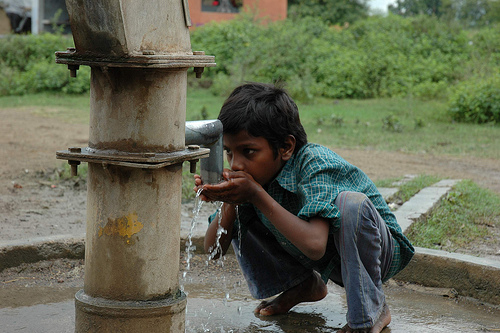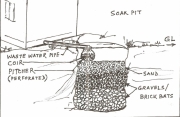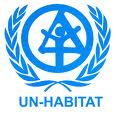/topics/health
Health
Inspiring progress- Learning from Exnora Green Pammals solid waste management partnerships in four localities
Posted on 22 Nov, 2014 10:30 AMThis booklet by Exnora Green Pammal (EGP) begins by highlighting the grave situation in relation to solid waste management in the country and the steps undertaken by the government to tackle this issue. The document presents a review of the efforts undertaken by EGP, an NGO based in Chennai, which has been implementing solid waste management projects with a variety of local bodies in accordance with the government’s rules.
India’s solid waste crisis is undermining the nation’s efforts to improve public health, protect the environment and stop climate change. India produces a staggering amount of municipal solid waste every day and the rate of production is expected to climb steadily as the nation becomes more populated, urbanised and economically developed.
Although the Indian government has enacted rules for management and handling of municipal solid waste, the results as per the year 2010 indicate that most localities have not fully complied with the rules and the situation has found to be getting worse day by day. Widespread, prolonged noncompliance with the rules and the rapid, highly-visible environmental degradation has led to calls for a changes in the nation’s waste management policy.
Seven Steps to Hygiene- An educational booklet by Utthan
Posted on 22 Nov, 2014 10:30 AMThis document is an educational booklet on sanitation and hygiene published by Utthan, which works towards empowering women's groups to seek clean and adequate quality of water for all.
The booklet includes the details of seven steps that can be undertaken to attain sanitation and hygiene. The details have been explained in a manner that is simple and understandable and includes illustrations that are self explanatory and easy to follow.
The seven steps include:
- Use and protection of water sources
- Managing drinking water
UN General Assembly's resolution on water and sanitation as a human right
Posted on 22 Nov, 2014 10:30 AMThe recent UN General Assembly Resolution on declaring water and sanitation as human right is or can be a powerful impetus to securing universal access to water and sanitation for people everywhere. This is the most recent in a string of initiatives to advance the provision of these essential services. Beginning with the UN Decade of Water in the eighties, then the declaration of the Millennium Development Goals, and later the adoption of General Statement 15 by the Economic and Social Council of the United Nations in 2002 the recognition of the fundamental importance of water (and more recently sanitation) to life, health and well being has been accepted at the international level. In India, while there is no specific mention of the right to water in the Constitution, the Supreme Court in its judgement(s)has upheld this as part of the right to life. Some organizations are working to make this a fundamental right, to remove any ambiguity.

Boy drinking water from handpump in Guna, Madhya Pradesh - Handpumps and wells are still one of the major source of drinking water in India.
Photo credits: Anil Gulati
Floods drinking water contamination mining and waterbodies water bills water conflicts News roundup 17 August 2010
Posted on 22 Nov, 2014 10:30 AMFloods: lessons to be learnt from the massive flooding in Surat city
A report by IIM criticises the way in which dams are managed in the country and calls for the need to apply Management Science / Operations Research techniques and information technology to improve dam management and prevention of floods
Deaths due to water pollution
Posted on 22 Nov, 2014 10:30 AMDeaths due to water pollution occur mainly as a consequence of drinking of contaminated water. The common diseases caused by consumption of contaminated water are Cholera, Viral Hepatitis, Enteric Fever (Typhoid) and Acute Diarrhoeal Diseases (ADD).
The number of deaths reported State-wise on account of Cholera, Viral Hepatitis, Enteric Fever (Typhoid) and Acute Diarrhoeal Diseases (ADD) for the years 2007, 2008 and 2009 are given in Annexure – I-III.
Impact assessment of Nirmal Gram Puraskar NGP awarded panchayats A report by TARU
Posted on 22 Nov, 2014 10:30 AMThe Total Sanitation Campaign (TSC) of the Rajiv Gandhi National Drinking Water Mission (RGNDWM), Govt of India was launched to cover all households with water and sanitation facilities and promote hygiene behaviour for overall improvement of health of the rural population. Panchayati Raj Institutions (PRIs) were involved in scaling up the TSC to promote large scale social mobilisation to bring about behavioural change.
School water sanitation and hygiene education Paper by Water for People
Posted on 22 Nov, 2014 10:30 AM This document by Water for People, emphasises the importance of appropriate sanitation coverage in schools that is gender sensitive and culturally acceptable to the needs of both boys and girl students, rather than the exclusive focus on adequacy of facilities.
This document by Water for People, emphasises the importance of appropriate sanitation coverage in schools that is gender sensitive and culturally acceptable to the needs of both boys and girl students, rather than the exclusive focus on adequacy of facilities.
It discusses the case of schools in rural areas in West Bengal where it was found that although the coverage of sanitation facilities was reasonable, lack of adequate availability of water, lack of consideration to student differences in terms of age and gender in the construction of latrines and drinking water facilities, poor systems of maintainence and disposal of wastes made the sanitation facilities inappropriate for use.
Urban Population and WatSan: A brief status report by WaterAid 2009
Posted on 22 Nov, 2014 10:30 AMThis document by WaterAid India, India highlights the poor water and sanitation situation in the urban slums in India, in the context of rapid urbanisation and the increase in the number of slums and slum dwellers in the cities.
Rejuvenation of community toilets A policy paper by UNHABITAT and Government of Madhya Pradesh
Posted on 22 Nov, 2014 10:30 AM The policy paper examines the condition of community toilet in terms of its infrastructure, operation & maintenance, uses and payment of user charges. The paper is a result of a joint collaboration between Water for Asian Cities (WAC) Programme of UN-HABITAT and the Directorate of Urban Administration & Development, Government of Madhya Pradesh.
The policy paper examines the condition of community toilet in terms of its infrastructure, operation & maintenance, uses and payment of user charges. The paper is a result of a joint collaboration between Water for Asian Cities (WAC) Programme of UN-HABITAT and the Directorate of Urban Administration & Development, Government of Madhya Pradesh.
In Madhya Pradesh, WAC is supporting Asian Development Bank-financed project in cities of Bhopal, Gwalior, Indore and Jabalpur to improve and expand urban water and sanitation services. This study has been taken up to monitor implementation of the water and sanitation related targets.
Empowerment through action: The story of Anna Lakshmi
Posted on 22 Nov, 2014 10:30 AMThis article shows how women are catalysts for advocating widespread improved sanitation and – at the same time – reap substantial benefits in a program promoted by an NGO called Gandhigram Trust. The empowerment of women and marginalized populations is a vital step in realizing gender equality – equal access, planning, and management – for water and sanitation.





